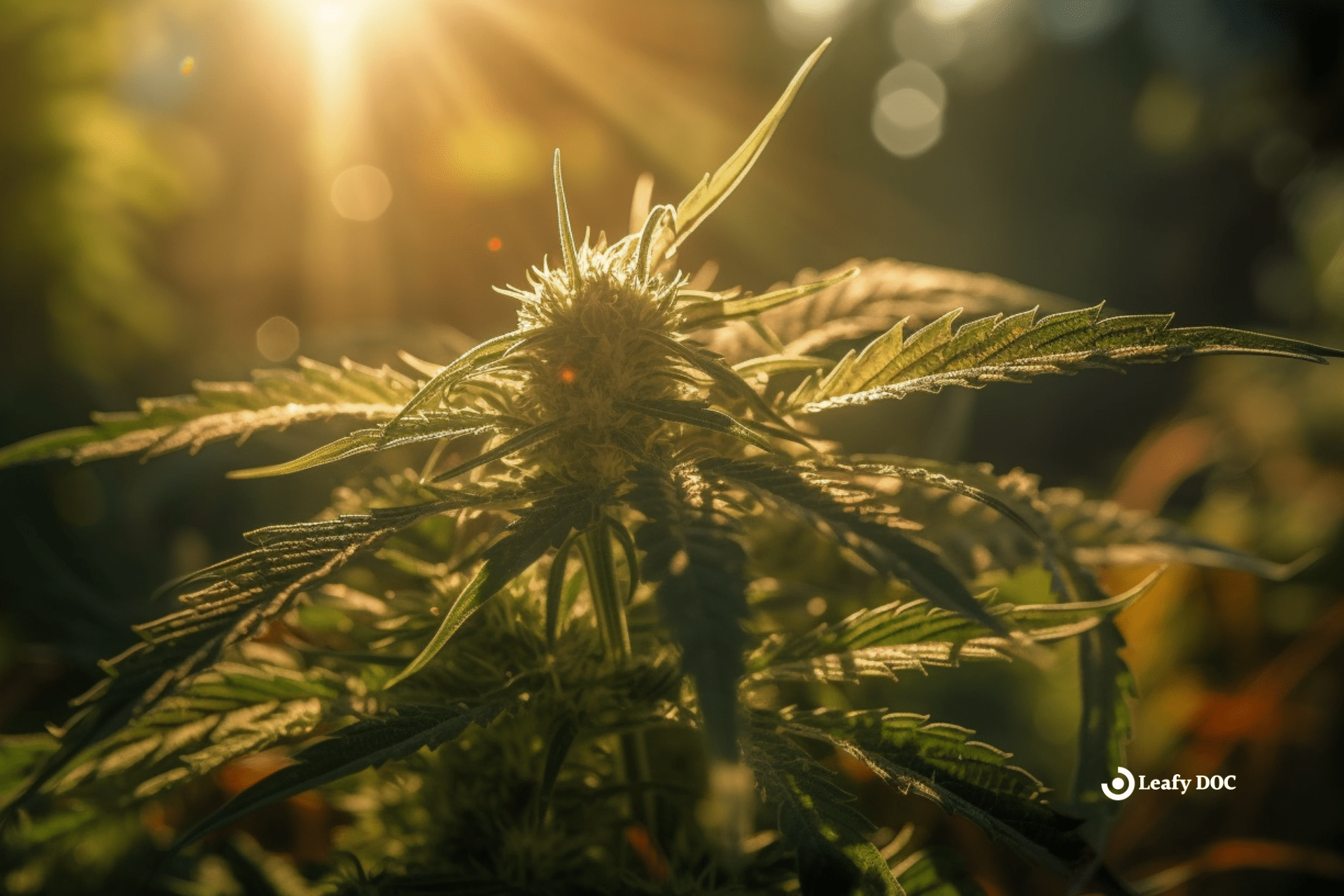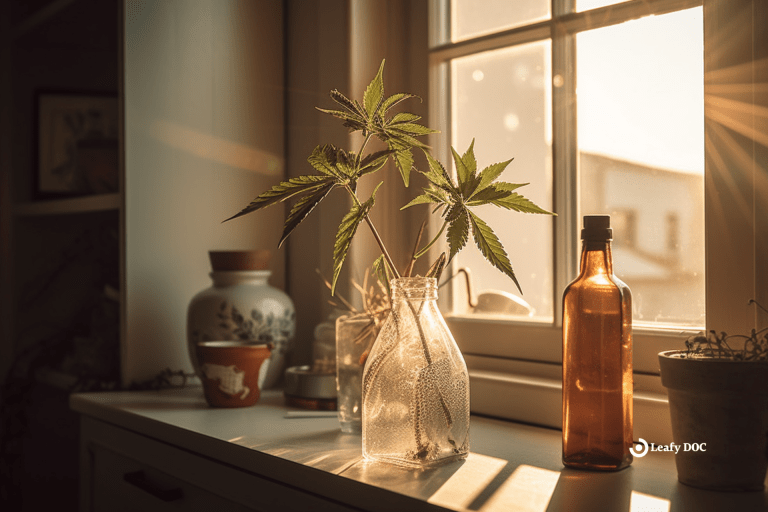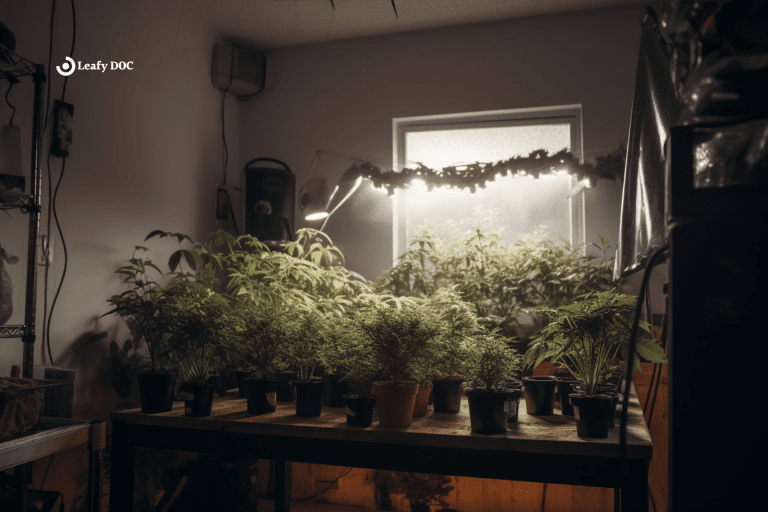Why Does Cannabis Have A Skunky Odor?
by Haley Mills · October 25, 2023
Uncover the fascinating science behind cannabis’ skunky aroma! Find out why weed smells like a skunk and satisfy your curiosity. Click here to unlock the secret now!

Cannabis, also known as marijuana, is a plant that has captivated human interest for centuries. Apart from its psychoactive effects, one of the most distinctive features of cannabis is its pungent odor.
The skunky smell associated with cannabis is often a subject of curiosity and intrigue, prompting the question: why does cannabis have a skunky odor?
Terpenes are organic compounds in various plants, including cannabis, that contribute to their unique aromas. These compounds are produced by the plant’s resin glands, which are most abundant in the flowers or buds. The specific terpenes responsible for the skunky odor in cannabis are known as thiols, which are sulfur-containing compounds. Thiols have a distinct pungent smell, reminiscent of skunk spray, and are found in trace amounts in cannabis.
Understanding the role of terpenes and their chemical composition can illuminate why cannabis has such a skunky odor.
Key Takeaways
- Cannabis has a distinctive skunky odor due to the presence of terpenes, specifically thiols, which are sulfur-containing compounds.
- The skunky odor of cannabis can vary depending on the specific terpenes present, such as myrcene, pinene, and limonene.
- Terpenes in cannabis play a role in its evolution and survival by attracting pollinators and repelling predators.
- Understanding the factors influencing the skunky odor of cannabis can help cultivators and breeders manipulate strain preferences.
The Chemistry Behind Cannabis Odor
The distinctive skunky odor of cannabis is primarily due to a group of volatile organic compounds known as terpenes. Terpenes are aromatic compounds found in various plants, including cannabis, and are responsible for the distinct smells and flavors associated with different strains of cannabis. The terpenes present in cannabis can vary widely, with over 200 terpenes identified so far.
One of the most abundant terpenes in cannabis is called myrcene, which contributes to the skunky aroma. Myrcene is also found in other plants such as hops, giving beer its characteristic smell. Other terpenes that contribute to the cannabis odor include pinene, which has a pine-like scent, and limonene, which has a citrusy aroma. These terpenes, along with other compounds found in cannabis, interact and combine to create the complex and unique odor profile of each strain.
The skunky odor of cannabis has been a subject of interest for both scientists and consumers. While some people may find the smell unpleasant, others may enjoy it and associate it with the desired effects of cannabis. The odor of cannabis can influence consumer preferences and play a role in strain selection.
Growing research indicates potential health benefits associated with the odor of cannabis. Some studies suggest that certain terpenes found in cannabis, such as myrcene, may have anti-inflammatory and analgesic properties. These findings highlight the importance of understanding the chemistry behind cannabis odor and its potential implications for consumer preferences and health.
Terpenes: The Culprits Behind the Skunk Smell
Terpenes are a class of organic compounds found in various plants, including cannabis. These compounds are responsible for the distinctive smell and taste of different strains of cannabis. Regarding the skunky odor, terpenes called thiols are the culprits. Thiols are sulfur-containing compounds with a pungent smell similar to skunks. The cannabis plant produces them as a defense mechanism against predators.
The strong smell of cannabis terpenes can significantly impact human perception. The skunky odor may be off-putting to some, while others may find it intriguing or even enjoyable. This variation in perception can be attributed to differences in individual sensitivity to odors and personal preferences. Some people may find the skunky smell overpowering, while others may appreciate it as a unique characteristic of cannabis.
Cannabis terpenes also have potential benefits. Research suggests that terpenes may contribute to the entourage effect, where the combination of different compounds in cannabis work together to produce therapeutic effects. Some terpenes have been found to have anti-inflammatory, analgesic, anti-anxiety, and anti-depressant properties. They may also enhance the absorption of other compounds in cannabis, such as cannabinoids like THC and CBD.
The Role of Terpenes in Cannabis Evolution
In the case of cannabis, terpenes contribute to its skunky odor and play a crucial role in the plant’s evolution and survival.
One of the evolutionary benefits of terpenes in cannabis is their ability to attract or repel certain animals and insects. Some terpenes, such as limonene and pinene, give off a citrus or pine scent that can attract pollinators like bees and butterflies. These pollinators play a vital role in the reproduction of cannabis plants by transferring pollen from male to female flowers. By emitting these terpenes, cannabis plants increase their chances of successful pollination and reproduction.
On the other hand, certain terpenes in cannabis have evolved to repel potential predators or herbivores. The skunky smell associated with cannabis is primarily attributed to a terpene called myrcene, also found in other pungent plants like hops. This strong odor is a defense mechanism, deterring animals from feeding on the plant. By producing terpenes with potent smells, cannabis plants have a better chance of survival and avoiding damage caused by herbivores.
Terpenes also contribute to the overall health and vitality of cannabis plants. Terpenes are thought to have antimicrobial and antifungal properties, protecting the plant from potential infections and diseases. They also have potential therapeutic benefits for humans, with some terpenes exhibiting anti-inflammatory, analgesic, and antianxiety properties.
Factors Affecting Cannabis Odor
Various environmental factors influence the odor of cannabis. One key factor is the growing conditions of the plant. Cannabis plants that are grown outdoors in natural sunlight have been found to have a more complex and diverse aroma profile compared to those grown indoors under artificial lights. This is because outdoor-grown plants are exposed to a wider range of environmental factors, such as temperature, humidity, and air quality, all contributing to developing different odor compounds.
Another environmental factor that can influence the odor of cannabis is the presence of certain pests or pathogens. For example, spider mites or powdery mildew can produce a distinct musty or moldy odor in the plant. Additionally, using fertilizers or pesticides during cultivation can contribute to the overall odor profile of cannabis.
The genetics of cannabis strains also play a significant role in determining the plant’s odor. Different strains of cannabis contain different combinations and concentrations of terpenes, which are organic compounds responsible for the characteristic aromas of plants. These terpenes range from fruity and floral scents to pungent and skunky odors. The specific genetics of a strain will dictate which terpenes are present and in what quantities, ultimately influencing the odor profile of the cannabis.
Understanding the Cultural Significance of Cannabis Odor
Different strains of cannabis can have distinct aromas, ranging from fruity and floral to earthy and skunky. These aromas result from the specific terpenes present in each strain, which are organic compounds responsible for the scent and flavor of plants. The skunky odor, in particular, is often associated with strains high in the terpene called myrcene. This terpene not only contributes to the pungent smell, but it also has potential sedative effects, making it a preferred choice for those seeking relaxation and stress relief.
The distinct skunky scent of cannabis often serves as a conversation starter and a way to identify fellow cannabis enthusiasts. It can create a sense of community and camaraderie among individuals with a common interest in cannabis. In addition, the odor can also evoke feelings of nostalgia and familiarity for those who have grown up around cannabis or have had previous positive experiences with it. However, it’s important to note that the perception of cannabis odor can vary significantly among individuals, and not everyone may find the skunky smell pleasant.
Frequently Asked Questions
How does the skunky odor of cannabis differ from other types of smells?
The skunky odor of cannabis differs from other smells due to the specific chemical compounds present in the plant. Terpenes and terpenoids, responsible for the distinct aroma, interact with receptors in our olfactory system.
Are there any health risks associated with the skunky smell of cannabis?
The skunky odor of cannabis is due to volatile compounds called terpenes. While the smell itself is not harmful, the social acceptance of the odor and the environmental impact of cannabis cultivation are important considerations.
Can the smell of cannabis be masked or eliminated?
The smell of cannabis can be masked or eliminated using odor-neutralizing sprays or aromatherapy techniques. Odor-neutralizing sprays work by chemically altering the odor molecules, while aromatherapy techniques use essential oils to create a more pleasant scent.
Is there a way to determine the potency or quality of cannabis based on its odor?
Determining the potency or quality of cannabis-based on odor can be challenging. While aroma can give some clues, it is not a definitive indicator. Evaluating terpene profiles, which contribute to the odor aromatics, can provide a more accurate assessment.
Are there any legal regulations regarding the odor of cannabis?
There are legal regulations regarding the odor of cannabis due to its potential environmental impact and public nuisance. These regulations aim to control and minimize the odor emitted from cannabis cultivation and processing facilities to maintain air quality and community well-being.
Last Updated: August 8, 2024
Get Approved for Your Medical Marijuana Card in Minutes!

Get Your Medical Card
Connect with a licensed physician online in minutes

Like This Article?
Share with your friends
Table of Contents
Keep Reading
-
Medical Marijuana VS Antidepressants
Uncover the truth about Zoloft and marijuana: Which is more effective for treating mental health conditions? Explore the surprising benefits of medical marijuana and make an informed decision for your well-being. Click here to discover the answers now!
-
A Medical Marijuana Cardholder’s Guide To Grow Healthy Weed
Discover how medical marijuana cardholders can grow their own top-quality cannabis with this essential guide. Cultivate healthy weed today and unlock the secrets to a thriving garden. Don’t miss out, start growing now!
-
5 Steps to Obtain Your California Medical Marijuana Card
Learn how to obtain your California medical marijuana card in five simple steps.



